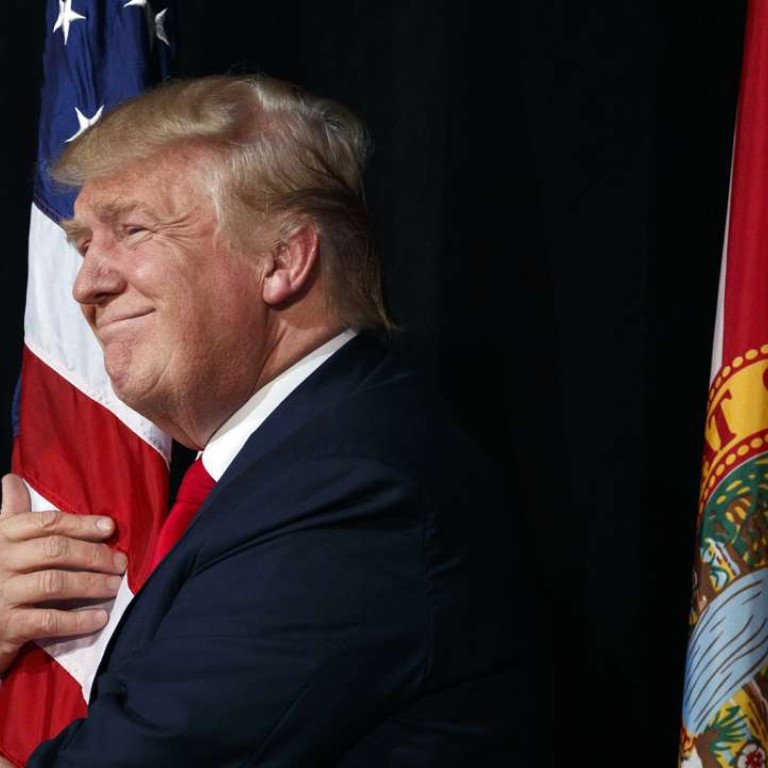
And so began the Great Age of Trump, with an agenda fuelled by social media and hunger for revolt
Analysis: Trump’s plain-speaking way of voicing the frustrations of makeshift coalitions allowed them to quickly come together to become a formidable force
The Age of Trump has begun, a new chapter in American history where social-media-driven people power will set the nation’s agenda and redefine government’s role in its life.
Historians compare Trump’s triumph to the rise of Andrew Jackson in 1828 and Franklin D. Roosevelt in 1932. Both presidents defeated long-entrenched powers, cobbled together new constituencies from the grass roots, defied the distant power brokers of finance and defined new, sweeping roles for the presidency and government.
They, and Trump, won their elections because they gave voice to a population that had long felt disenfranchised.

This new epoch promises to bring voters together supporting different ways of governing and campaigning. Trump was the first major presidential candidate to fully harness the power of social media, where like-minded people can come together and put their muscle behind single issues.
That builds on a strong push from conservative media. Outlets including, notably, Fox News Network, Breitbart, the Drudge Report and radio talk shows hammered away, for example, at the notion that borders were dangerously porous.

“People were angry about what they saw as an America different from what they grew up with, but they had put up with it,” said Steve Mitchell, chairman of the nonpartisan Mitchell Research & Communications in East Lansing, Michigan.
An army of the discouraged was waiting, and Trump was able to mobilise it
Their patience didn’t seem to be paying off. The economy was in its seventh year of recovery but blue-collar workers weren’t feeling it. The Obama administration revamped the health care system and pledged costs would stabilise, but premiums were soaring. Immigrants who were in the country illegally seemed to be everywhere.
An army of the discouraged was waiting, and Trump was able to mobilise it. “He connected in ways with people no one else did,” Republican House Speaker Paul Ryan said Wednesday.
Hillary Clinton had all the right campaign tools for a bygone era, notably more money and more door-knockers. But Trump had the tweeters and Facebook users. Or as Gary Bauer, chairman of the conservative Campaign for Working Families put it, “Americans who live and work on Main Street overcame the combined resources of the media, the entertainment industry, and corporate and political elites.”
The social media movement gives President-elect Trump an ability to build organic support for his pet initiatives, without having to go through the usual political party channels
Trump became a frequent tweeter and Facebook presence. Over the campaign’s last month, more than 67 million people engaged in conversations about Trump, about 8 million more than discussed Clinton. There were more than 1.1 billion interactions involving Trump, including likes, post, comments and shares about him.
The social media movement gives President-elect Trump an ability to build organic support for his pet initiatives, without having to go through the usual political party channels. President Barack Obama has used social media to build support for his favorite ideas, though doing so often plays to an audience already sympathetic.
Nonetheless, Trump is expected to launch strong, social-media-fueled efforts to reduce personal income taxes, crack down on illegal immigration, and repeal and replace Obamacare.
This new way of building coalitions will have an effect not only on governing but also on how the country chooses its leaders.
In all this are echoes of past elections where the role of government and politics underwent dramatic shifts.
Jackson’s crusade against the Eastern establishment won him the popular vote in 1824, then he lost the election when his rivals teamed up to deny him an electoral majority. Four years later, he won the first of his two terms, became a founder of the modern Democratic Party and strengthened the power and reach of the presidency. “Jacksonian Democracy” dominated American policy until the pre-Civil War era of the mid-1850s.
Roosevelt, too, expanded executive power to dramatically redefine the role of government. Faced with the Great Depression, he led a coalition of Southerners and newly powerful urban residents. The New Deal reinvented government as the provider of an economic safety net, guaranteeing Social Security for seniors, providing tighter regulation of financial markets and providing insurance for most bank deposits.
Trump launched a new era Tuesday. His prescriptions are unlikely to be as radical as those of Jackson or Roosevelt — the times are not as dire — but his style and his coalitions promise to be. Because the 45th president is really neither a Republican or a Democrat.
“Trump beat the Republicans, then he beat the Democrats,” said Gary Pearce, a Democratic consultant based in Raleigh, N.C. “Trump is really a third party candidate.”

